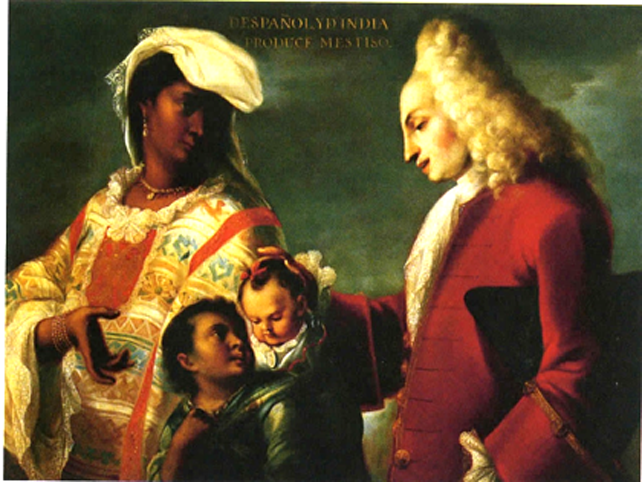After a Series of casta Paintings By Juan Rodríguez Juárez, C. 1715
1. De Español Y De India Produce Mestiso
The canvas is a leaden sky
behind them, heavy
with words, gold letters inscribing
an equation of blood.
this plus this equals this—as if
a contract with nature, or
a museum label,
ethnographic, precise. See
 how the father’s hand, beneath
its crown of lace,
curls around his daughter’s head;
she’s nearly fair
as he is —calidad. See it
in the brooch at her collar,
the lace framing her face.
An infant, she is borne
over the servant’s left shoulder,
bound to him
by a sling, the plain blue cloth
knotted at his throat.
If the father, his hand
on her skull, divines—
as the physiognomist does—
the mysteries
of her character, discursive,
legible on her light flesh,
in the soft curl of her hair,
we cannot know it: so gentle
the eye he turns toward her.
The mother, glancing
sideways board him—
the scarf on her head
white as his face,
his powdered wig—gestures
with one hand a shape
like the letter C. See,
she she seems to say,
what we have made.
The servant, still a child, cranes
his neck, turns his face
up toward all of them. He is dark
as history, origin of the word
native: the weight of blood,
a pale mistress on his back,
heavier every year.
how the father’s hand, beneath
its crown of lace,
curls around his daughter’s head;
she’s nearly fair
as he is —calidad. See it
in the brooch at her collar,
the lace framing her face.
An infant, she is borne
over the servant’s left shoulder,
bound to him
by a sling, the plain blue cloth
knotted at his throat.
If the father, his hand
on her skull, divines—
as the physiognomist does—
the mysteries
of her character, discursive,
legible on her light flesh,
in the soft curl of her hair,
we cannot know it: so gentle
the eye he turns toward her.
The mother, glancing
sideways board him—
the scarf on her head
white as his face,
his powdered wig—gestures
with one hand a shape
like the letter C. See,
she she seems to say,
what we have made.
The servant, still a child, cranes
his neck, turns his face
up toward all of them. He is dark
as history, origin of the word
native: the weight of blood,
a pale mistress on his back,
heavier every year.